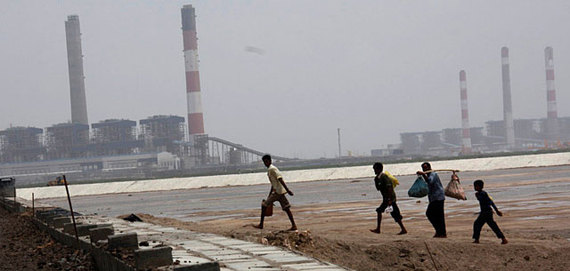Photo courtesy of Joe Athialy, Bank Information Center
Just a few short months ago the World Bank got itself on the right side of history by placing severe restrictions on coal finance. That was thanks in large part to World Bank President Dr. Kim's leadership. Now the institutions past transgressions are coming back to haunt him. An internal investigation into the controversial Tata Mundra project in India has found widespread impacts and policy violations. In response the institution vigorously defended the project while Dr. Kim swept the findings under the rug.
It's important to know how the IFC and the World Bank justified Tata Mundra - it was much needed cheap power in a country starving for it. Tata Mundra was the first, and therefore the flagship, project in a series of nine 'Ultra Mega Power Projects' (UMPPs). Each of these behemoths is roughly equivalent to eight average US coal plants. The abundant cheap power they would provide was sure to power India's growth. But the problems with Tata's cheap power started early.
While Tata owned their own mines in Indonesia, the government decided to raise their export benchmark pricing to reflect higher international coal prices - effectively doubling the price of coal. The Tata's (along with every other UMPP) went directly to the Indian regulators demanding the ability to break their contract and raise rates on average Indian citizens. That move essentially broke the social contract they had enjoyed - providing cheap power despite social and environmental impacts.
But while the Tata's have fought for a tariff revision they have yet to convince the states to approve. In the meantime they've been hemorrhaging cash. That's why the manager of Tata Power calls the project an 'albatross around the neck' of the company. An albatross the IFC and other financiers have sunk billions into. It's into this morass that the internal investigation was released.
The IFC's Compliance Advisor Ombudsman (CAO) found widespread impacts and policy violations including serious violations of mandatory safeguards. While the CAO stopped short of calling for IFC's withdrawal from financing the project, the CAO found that the 'IFC weaknesses in reviewing the client's risk assessment and mitigation did not support the formation of a robust view that the project met the IFC's policy requirements, that IFC did not consider alternative project design to avoid or minimize impacts, and that IFC has not treated complainants' concerns as compliance issues.' A damning conclusion if ever there was one.
But in an eleven page response Anita George and Willian Balmer, IFC's Asia-Pacific Director for Infrastructure and Natural Resources and Director for Environment and Social Governance, respectively dismissed the findings. They rejected expert findings, defended their project decision and their client and issued no remedial action. After a month of silence, Dr. Kim cleared management response.
In response Dr. Patel president of MASS the local fisherman group opposing the project said, "By clearing the IFC response, President Kim sends a clear message that he supports his staff's denial of science, of expert findings and endorses management's avoidance of accountability," says Dr. Patel.
Soumya Dutta who led an independent fact finding mission that produced a report entitled 'The True Cost of Coal' said, "By flatly rejecting the findings of independent audit body, Kim revealed the highest form of hypocrisy in his climate stance."
All of which leaves us to wonder where Dr. Kim actually stands. Is the climate champion really willing to sweep a troubling report on a dirty coal plant under the rug? What does that mean for his willingness to critically assess the environmental and social impacts of the proposed Kosovo coal plant - the real test case of the World Bank's new coal restrictions? If Tata Mundra is any indication the World Bank and Dr. Kim are in for more coal controversy in the future.

